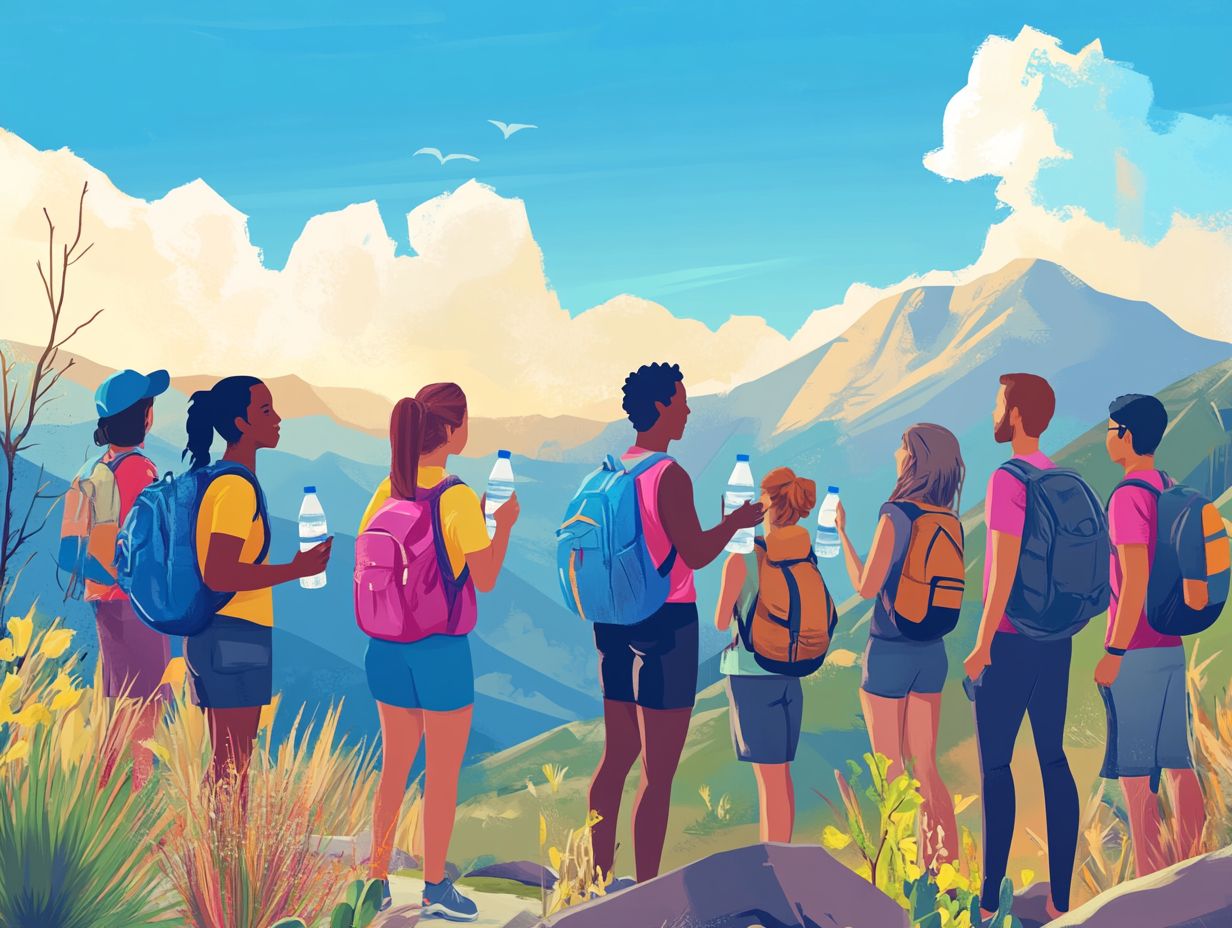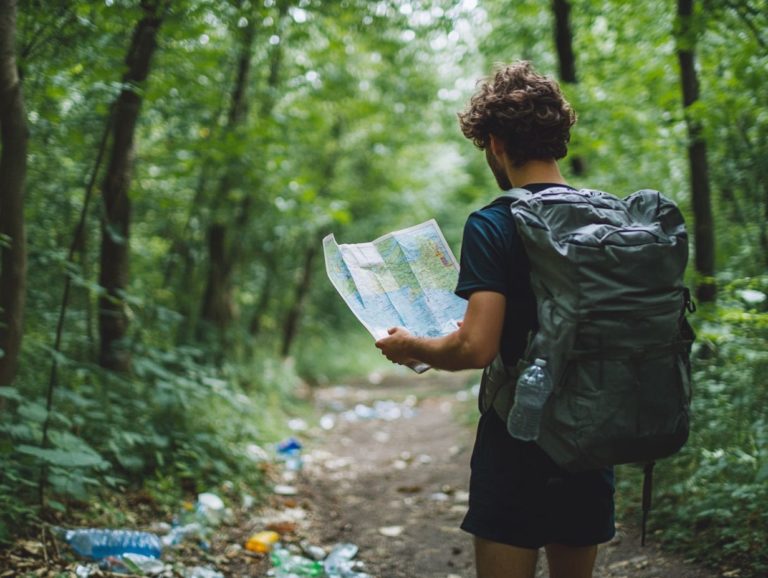How Can I Be a Responsible Tourist?
In today s world, travel presents an opportunity to immerse yourself in new experiences and cultures. The concept of responsible tourism has gained remarkable traction.
Get ready to learn exciting ways to embrace responsible travel! This article delves into the essence of responsible tourism, emphasizing its significance for both the environment and local communities.
You ll discover practical methods, from supporting local economies to minimizing your ecological footprint. We ll also provide you with tips for thoughtful travel planning, ensuring that your adventures yield positive impacts.
Together, you can make travel a powerful force for good!
Contents
- Key Takeaways:
- Understanding Responsible Tourism
- The Importance of Responsible Tourism
- Ways to Be a Responsible Tourist
- Respecting Cultural Differences
- Choosing Responsible Tourist Activities
- Tips for Responsible Travel Planning
- Researching Destinations and Tour Companies
- Packing Responsibly
- Supporting Local Businesses
- Frequently Asked Questions
- How Can I Be a Responsible Tourist?
- What does it mean to be a responsible tourist?
- How can I reduce my environmental impact as a tourist?
- What can I do to support the local community as a tourist?
- How can I respect the local culture and customs while traveling?
- What can I do if I see irresponsible tourist behavior impacting local communities?
- Is it possible to travel responsibly on a budget?
Key Takeaways:

- Be conscious of your impact on the environment and local communities when traveling.
- Choose responsible tourist activities, such as eco-friendly and community-based options, to support sustainability and cultural preservation.
- Plan your travels responsibly by researching destinations, supporting local businesses, and packing to minimize your environmental impact.
Understanding Responsible Tourism
Understanding responsible tourism begins with recognizing its core principles. These highlight ways to protect the environment while honoring local communities and encouraging authentic cultural interactions.
Advocates like Victoria Walker and Wesley Espinosa lead this movement, striving to minimize the tourism industry’s negative effects while enhancing travelers’ appreciation for genuine experiences.
In a world where Instagram-friendly destinations flood our feeds, the urgency for more mindful travel choices has never been more critical. By prioritizing ethical travel, you can ensure that your adventures contribute positively to the cultural heritage and economic growth of the places you explore, while also engaging with local communities.
Defining Responsible Tourism
Responsible tourism is all about embracing a travel style that prioritizes sustainable practices and ethical connections with local communities. This approach aims to minimize any negative impacts on both the environment and culture.
This approach invites you to reflect on your footprint through eco-friendly habits, like reducing waste and conserving resources. Supporting the local economy is vital; you re encouraged to opt for local businesses for your accommodations, dining options, and attractions, ensuring that your spending directly enriches the communities you visit.
This form of tourism also highlights the need to preserve cultural heritage. Engage with traditions and practices unique to each destination in a respectful manner. By nurturing a deeper understanding and appreciation of local customs, you, as a responsible traveler, play a significant role in sustaining both the environment and the vibrant cultural tapestry of the places you explore. For more insights, check out this guide on how to be a responsible tourist.
The Importance of Responsible Tourism
Responsible tourism is crucial today as it shapes local economies and communities. In today’s landscape, the tourism industry plays a vital role in influencing environmental and social dynamics.
With a growing awareness of the detrimental effects of tourism leakage when money meant for local communities does not benefit them and the social ramifications on host communities, travelers are encouraged to embrace more mindful travel practices.
The recent pandemic travel restrictions have underscored the necessity for community engagement. Destinations strive to recover and flourish while emphasizing sustainable practices that safeguard both the environment and local culture.
Join the movement for responsible tourism and make a positive difference wherever you go!
Environmental and Social Impact
The environmental and social impact of tourism is significant, influencing everything from local ecosystems to community well-being. Responsible tourism is a necessity in today s travel scene, especially as traveler sentiments shift towards more mindful practices.
This intricate relationship unfolds as tourists flock to natural wonders, often resulting in the degradation of fragile habitats and placing immense pressure on limited resources. When approached thoughtfully, tourism can promote sustainable practices that enhance conservation efforts and foster community development.
For example, responsible tourism can invigorate local economies, creating jobs and supporting the preservation of cultural heritage. Challenges exist, such as overcrowding and waste management, which become increasingly crucial in popular destinations.
Thus, cultivating an understanding of this delicate balance between exploration and preservation is essential to ensure that future generations can appreciate and benefit from these remarkable places.
Ways to Be a Responsible Tourist
As a responsible tourist, you embrace a commitment to support local communities, reduce your impact on the environment, and foster respectful interactions with the cultures you encounter. This approach guarantees your travels will make a real difference now!
Supporting Local Communities

Supporting local communities is essential to responsible tourism, as it directly boosts the local economy and fosters genuine connections through authentic interactions and the purchase of artisan goods.
When you prioritize local businesses think family-owned restaurants, charming craft shops, and guided tours led by community members you re not just enjoying a meal or buying a souvenir; you re helping to create sustainable livelihoods and preserve the rich tapestry of cultural heritage.
Engaging with local traditions and experiences not only enhances your journey but also gives the power to residents to share their unique customs and craftsmanship. This mutual exchange enriches your experience and cultivates meaningful connections and understanding across cultures.
By visiting farmers’ markets, participating in workshops, or choosing Airbnb accommodations, you have the chance to make a significant impact, ensuring that your adventures leave a positive legacy for the communities you explore.
Minimizing Environmental Impact
Minimizing environmental impact is essential for responsible tourism. You can play your part by selecting eco-friendly hotels known for their sustainability practices, making sustainable transportation choices, and embracing mindful consumption habits during your travels.
By choosing accommodations that prioritize renewable energy, implement water-saving technologies, and support local communities, you can make a big difference in reducing your carbon footprint. Opting for public transit, biking, or simply walking not only enhances your travel experience but also lessens your dependence on fossil fuels.
Incorporating habits like reducing waste, steering clear of single-use plastics, and sourcing local foods further aids in environmental preservation. By integrating these strategies, you not only benefit the planet but also cultivate a deeper connection with the places you visit, ultimately leading to a more enriching and fulfilling travel experience.
Respecting Cultural Differences
Respecting cultural differences is essential for responsible tourism. It enhances your travel experience while preserving local heritage and fostering meaningful interactions with the culture around you.
When you embrace the unique customs, traditions, and values of a destination, you enrich your journey and make a positive contribution to the local community. Ethical travel practices require you to appreciate local norms and understand rituals and lifestyles that may differ significantly from your own. By honoring these differences, you cultivate empathy, leading to deeper connections with the residents.
This mindful approach helps safeguard cultural identities while promoting sustainable practices. Your adventures can leave a lasting, positive impact on both the people you meet and the places you explore.
Choosing Responsible Tourist Activities
Choosing responsible tourist activities means selecting options that embrace eco-friendly practices, support community tourism, and offer opportunities for cultural immersion. This approach enhances your travel experience and benefits the local community.
Eco-Friendly and Sustainable Options
Eco-friendly and sustainable options are vital in responsible tourism. They provide a range of outdoor experiences that honor nature and uplift local communities.
By participating in activities like guided nature hikes, wildlife conservation programs, and farm-to-table dining experiences, you reduce your environmental footprint while deepening your appreciation for local cultures.
These sustainable practices enhance your travel experience and deliver economic benefits to the communities you visit, fostering growth and a sense of pride in preserving their natural landscapes and cultural heritage. Opting for eco-lodges or engaging in local tourism initiatives ensures that more revenue circulates within the local economy, empowering residents and fostering responsible stewardship of their cherished surroundings.
Community-Based Tourism
Community-based tourism invites you to immerse yourself in local culture and heritage. This promotes responsible tourism practices that create meaningful interactions between visitors and residents.
This form of tourism enlightens you about the traditions, crafts, and daily lives of indigenous communities. It fosters a rewarding exchange of stories and experiences that enrich both you and the locals. By choosing local guides and family-owned accommodations, you contribute to the economic sustainability of these regions while building authentic connections. For more insights, explore the top 10 responsible travel practices to follow.
These initiatives prioritize preserving local customs and protecting the environment, ensuring that tourism enhances rather than diminishes cultural identity and ecological integrity. By engaging with community-based projects, you gain a deeper understanding and appreciation of the local communities and their cultural heritage, enriching your experience far beyond the typical tourist visit.
Cultural Immersion Activities

Cultural immersion activities are essential to responsible tourism. They allow you to engage deeply with local culture and enjoy authentic experiences that enrich your journey.
Join in the fun of traditional cooking classes, explore local artisan workshops, or attend village festivals. Popular destinations like Machu Picchu and other tourist hotspots not only deepen your understanding but also foster meaningful connections with the host community.
By learning skills and art forms from local communities or volunteering for conservation projects, you play a vital role in preserving cultural heritage while supporting local economies.
These encounters promote sustainable practices. This ensures that the benefits of tourism reach the residents, creating a vibrant exchange where both you and the community flourish through shared experiences and mutual respect for local customs.
Tips for Responsible Travel Planning
Effective trip planning for responsible tourism demands thorough research into your chosen destinations. Understanding local insights and making well-informed choices aligned with ethical travel standards is key.
This approach ensures that your journey supports the local community and involves you in local activities.
Researching Destinations and Tour Companies
Researching destinations and tour companies is crucial for responsible tourism. It enables you to assess the local impact on the tourism industry and ensure your choices resonate with ethical standards.
By looking into various locations and the operators that serve them, you can uncover how your travel choices influence both the environment and local communities. This thoughtful approach encourages support for companies that prioritize sustainability and respect cultural heritage, as outlined in how to travel responsibly.
Engaging in this research deepens your understanding of the customs and values of the areas you visit. It fosters meaningful connections and enriching experiences. Ultimately, being well-informed gives you the power to make responsible decisions that support the local economy.
Packing Responsibly
Packing responsibly involves choosing eco-friendly products and minimizing waste. This aligns with the sustainable practices every conscientious traveler should embrace.
By prioritizing biodegradable products and reusable items, you can significantly lessen your environmental footprint while on the move. Selecting items like stainless steel water bottles, bamboo utensils, and organic cotton bags reduces your reliance on single-use plastics.
Consider investing in sustainable clothing made from recycled materials and adopting a buy less, choose well philosophy. These thoughtful choices cultivate a deeper connection with the destinations you explore, supporting the growth of eco-conscious travel communities.
Don’t miss out on the chance to connect with local cultures! Start planning your responsible travel adventure today!
Supporting Local Businesses
Supporting local businesses and hotels is essential for responsible tourism. It strengthens the local economy and fosters community spirit.
When you choose to shop at local markets, dine at family-owned restaurants, and stay in independently-owned accommodations like Airbnb, you’re ensuring that your spending makes a meaningful impact. These interactions help preserve unique cultural practices and support traditional craftsmanship and handcrafted items, creating connections between you and the residents.
Engaging with local artisans allows you to discover authentic products that reflect the region s heritage, enriching your travel experience in ways that mere sightseeing cannot.
By supporting small enterprises and local markets, you contribute to job creation and empower community members, thereby strengthening the very fabric of the local community. Your choices as a traveler can truly make a difference.
Frequently Asked Questions
How Can I Be a Responsible Tourist?

Becoming a respectful traveler and responsible tourist involves being mindful of your impact on the environment, culture, and economy of the places you visit. Curious about responsible tourism? Here are answers to some common questions.
What does it mean to be a responsible tourist?
Being a responsible tourist means being aware of your actions and the impact they have on the places you visit. It involves minimizing negative impacts on the environment, respecting local cultures and customs, and supporting the local economy.
How can I reduce my environmental impact as a tourist?
There are many ways to reduce your environmental impact as a tourist. Examples include:
- Using reusable water bottles
- Choosing eco-friendly accommodations
- Supporting local conservation efforts
What can I do to support the local community as a tourist?
One way to support the local community is by choosing local dining options and purchasing souvenirs from local artisans. Join thrilling community-based activities that directly benefit locals!
How can I respect the local culture and customs while traveling?
Before visiting a new destination, take the time to research the local culture and customs. Be respectful of dress codes, religious practices, and local traditions. Avoid activities that may harm the local culture or environment.
What can I do if I see irresponsible tourist behavior impacting local communities?
If you witness irresponsible tourist behavior, you can politely educate the person on how their actions may be harmful. You can also report any illegal or damaging behavior to local authorities or the tourism office.
Is it possible to travel responsibly on a budget?
Yes, it is possible to travel responsibly on a budget. You can:
- Choose budget-friendly accommodations with eco-friendly practices
- Support local businesses and vendors
- Participate in free or low-cost cultural activities
Start making a difference today choose local!






